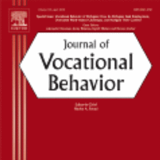IER News & blogs
Special edition of Journal of Vocational Behavior co-edited by Jenny Bimrose
 Jenny Bimrose has co-edited a special issue of the Journal of Vocational Behavior on refugees. Together with the other co-editors, she has co-authored the editorial for this special issue: Newman, A., Bimrose, J., Nielsen, I., & Zacher, H. (2018). Vocational Behavior of Refugees: How do Refugees Seek Employment, Overcome Work-related Challenges, and Navigate Their Careers? Guest Editorial. Journal of Vocational Behavior, 105, 1–5.
Jenny Bimrose has co-edited a special issue of the Journal of Vocational Behavior on refugees. Together with the other co-editors, she has co-authored the editorial for this special issue: Newman, A., Bimrose, J., Nielsen, I., & Zacher, H. (2018). Vocational Behavior of Refugees: How do Refugees Seek Employment, Overcome Work-related Challenges, and Navigate Their Careers? Guest Editorial. Journal of Vocational Behavior, 105, 1–5.
Call for Papers "Vocational Behavior of Refugees"
The Journal of Vocational Behavior (ABDC A*) is inviting papers on "Vocational Behavior of Refugees: How do Refugees Seek Employment, Overcome Work-Related Challenges, and Navigate their Careers?”.
Over the last two years we have witnessed the largest migration of refugees in history. As of early 2016 over 4.7 million people have fled the civil war in Syria and the terror regime of the so-called “Islamic State” in both Syria and Iraq, and a significant number presently live in refugee camps in the Middle East (UNHCR, 2016). The effects of this crisis have been immense, not only in neighbouring countries such as Lebanon, Jordan, and Turkey, but also in countries such as Greece, Germany, Hungary, and Austria, which are the final destinations for many refugees, and countries which have agreed to resettle smaller numbers of refugees from the conflict zones including Canada and Australia. The government authorities in these countries are in the process of developing policies to deal with the immediate influx of refugees, but also have to think of ways in which to integrate refugees into the mainstream society in the medium to long term.
Integration into mainstream society is an extremely challenging process for many refugees (Yakushko, Backhaus, Watson, Ngaruiya and Gonzalez, 2008). In addition to applying for asylum status and refugee resettlement and seeking family reunification, and learning the culture and language of the host country, refugees also have to seek employment to support the immediate needs of their families and re-establish a livelihood (Colic-Peisker and Tilbury, 2006). Policy makers have begun to recognize the importance of assisting refugees to obtain employment quickly, as stable employment amongst refugees has been found to reduce welfare dependency and to enhance the educational and health outcomes amongst the children of refugee families (Khoo, 2005; Pernice and Brook, 1996). However, current knowledge of how refugees, practitioners, organizations, and policy makers negotiate these issues is very limited (Morrice, 2011). Very few studies have examined refugees’ vocational behavior, including seeking employment, overcoming work-related challenges and traumata, and navigating careers after leaving their home country. In addition, we have limited understanding as to how organizations, practitioners, and policy makers can best assist refugees in the adaptation process.
In order to improve our understanding of the challenges and opportunities faced by refugees in seeking work, overcoming challenges and traumata, and adapting their careers, this special issue of invites articles that will discuss these issues.
Guest editors: Alex Newman, Deakin University; Jenny Bimrose, IER , University of Warwick; Ingrid Nielsen, Deakin University; and Hannes Zacher, Queensland University of Technology.
, University of Warwick; Ingrid Nielsen, Deakin University; and Hannes Zacher, Queensland University of Technology.
